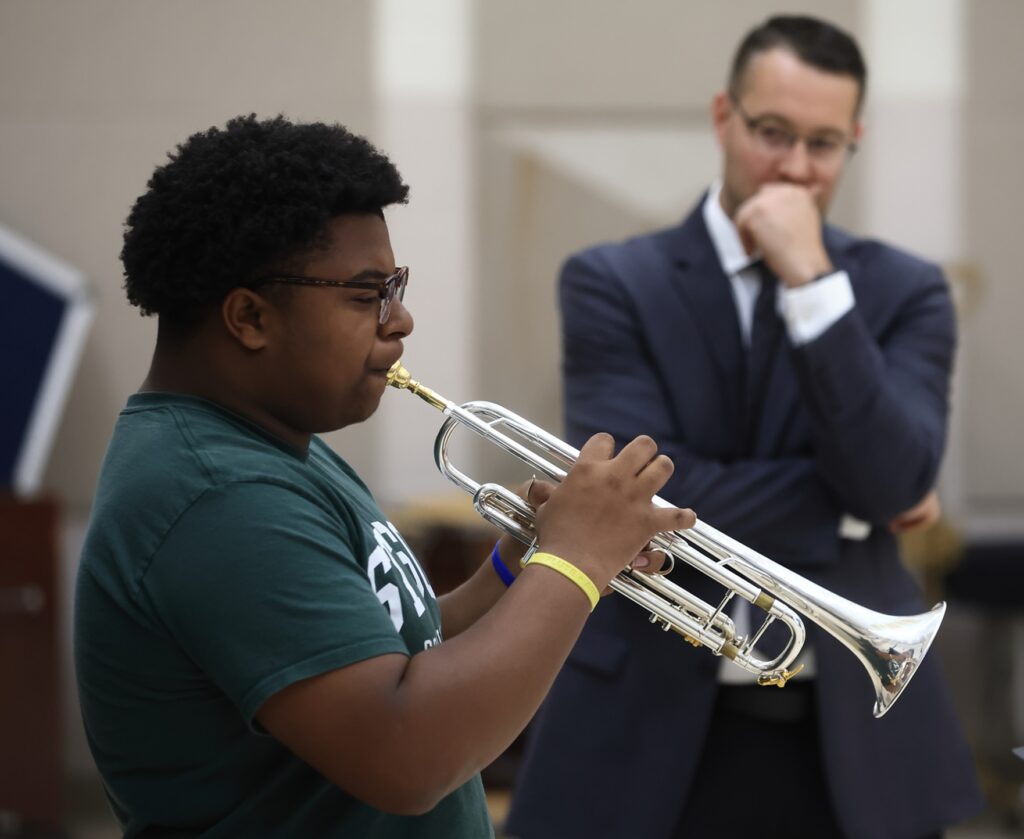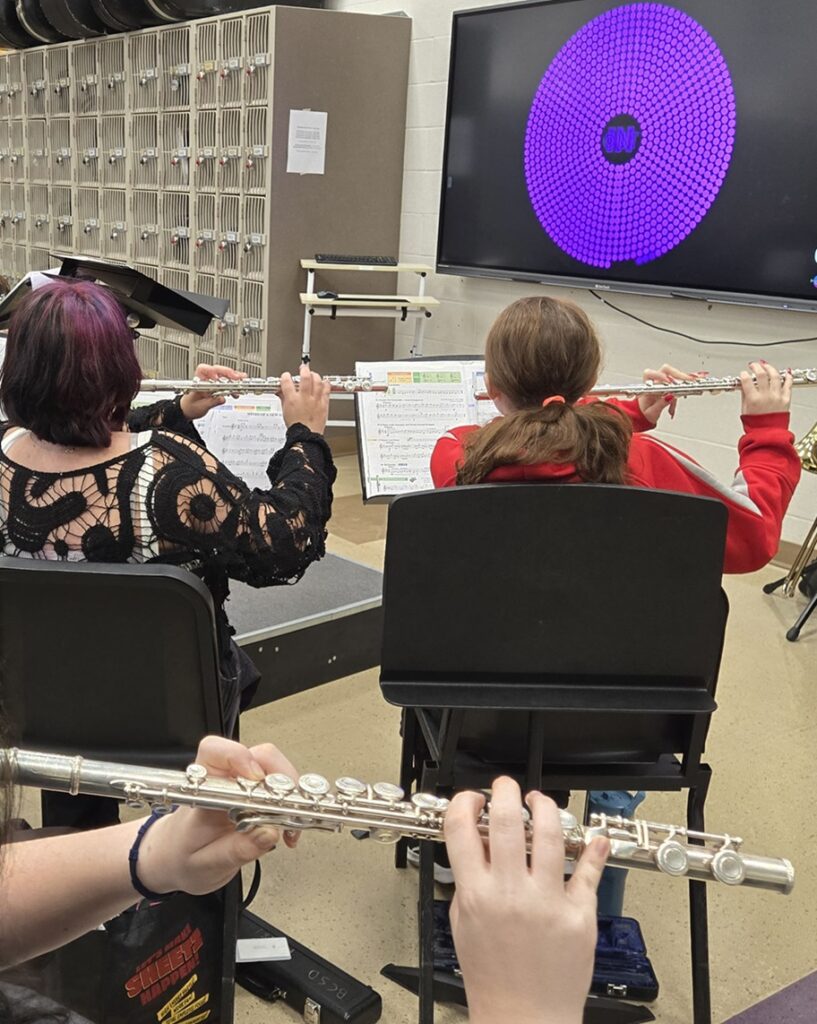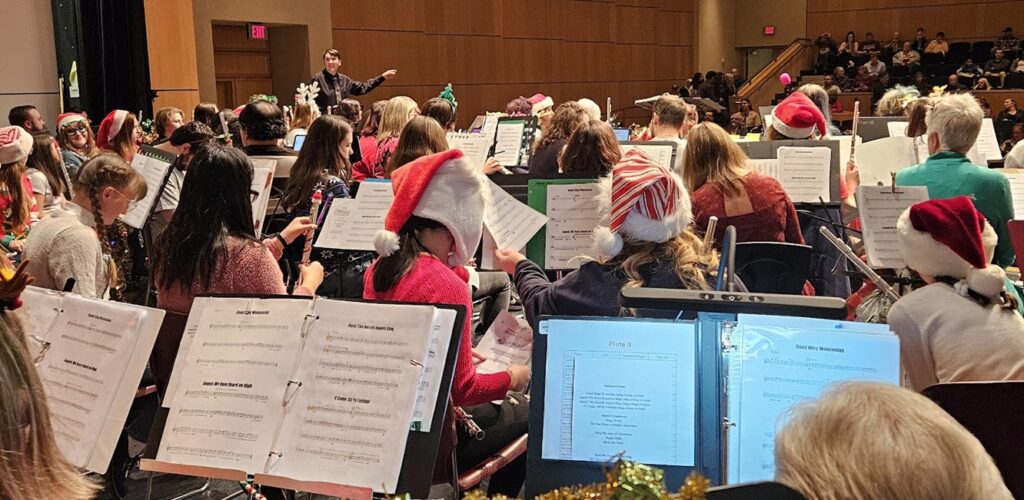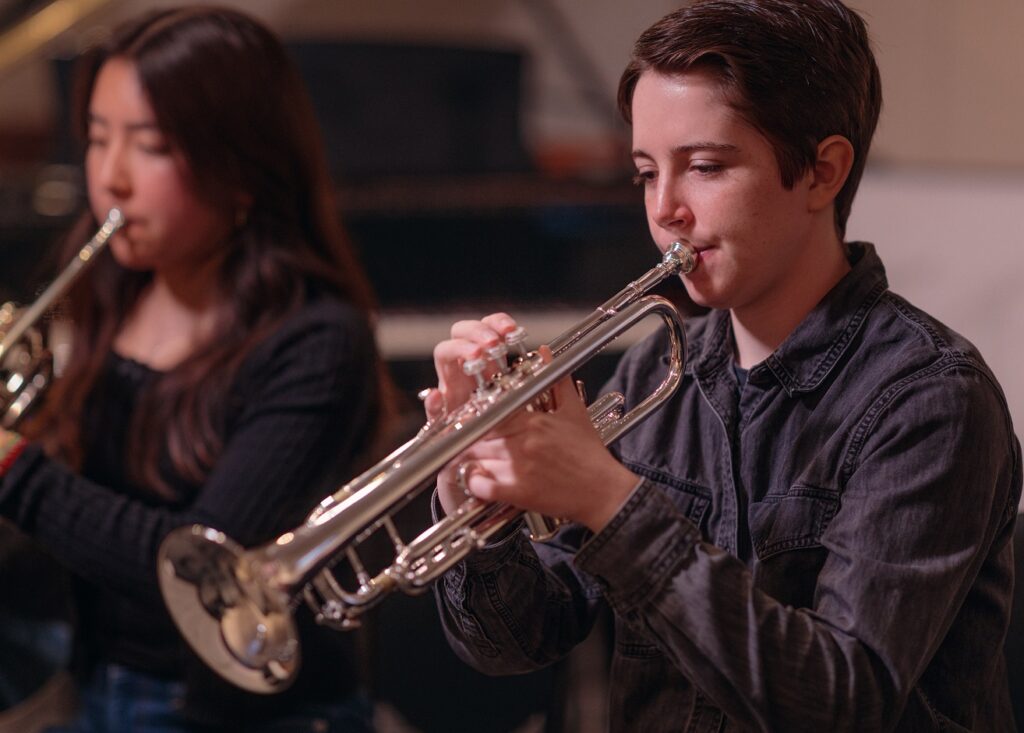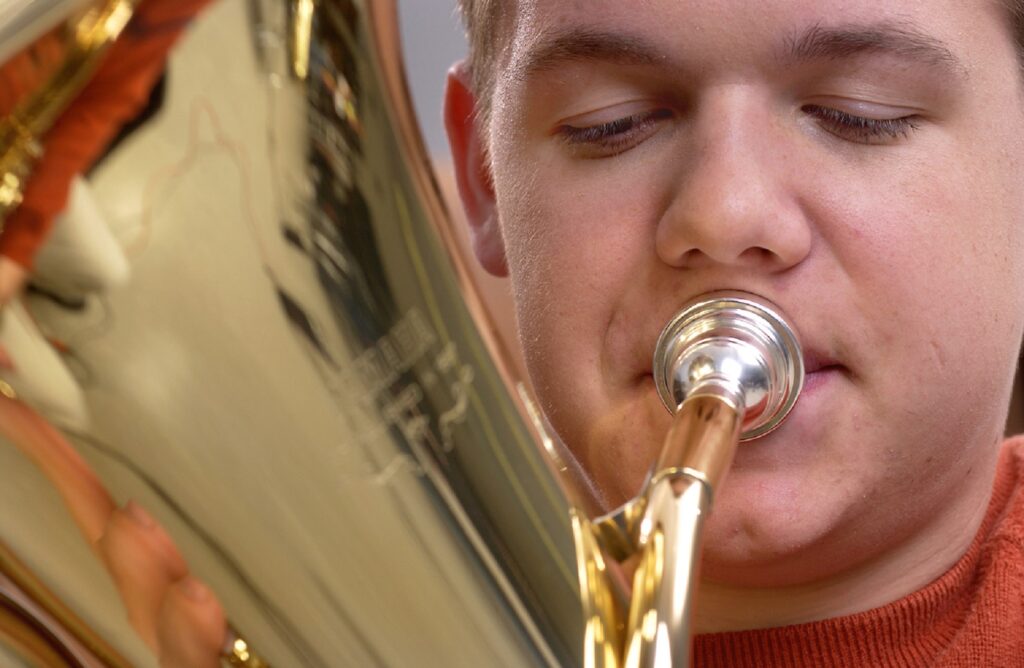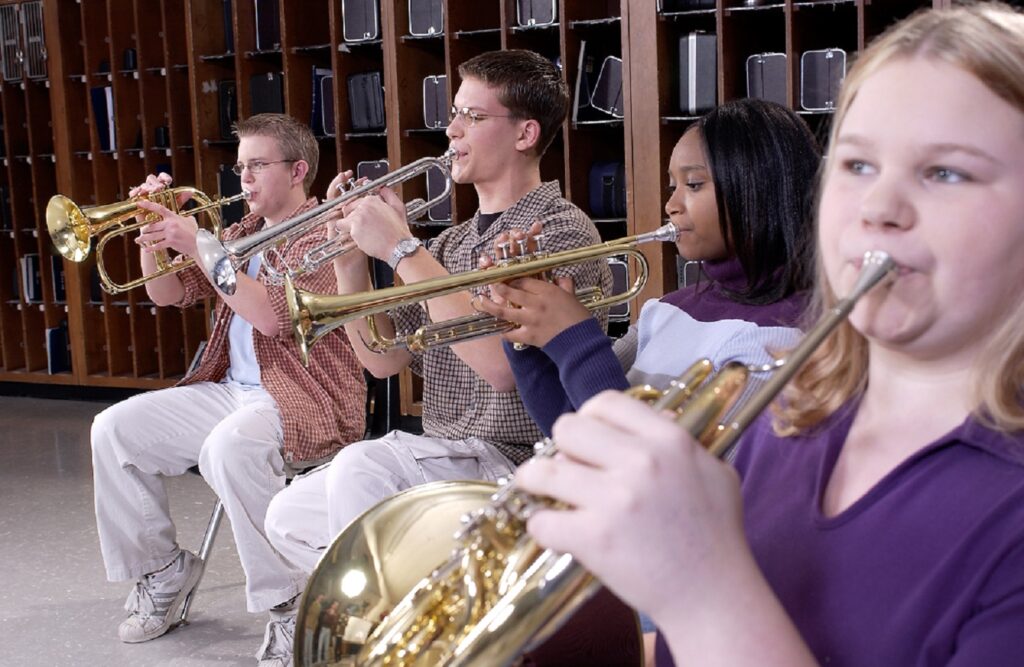Tagged Under:
You Don’t Have to Be a Pro to Go to a Guild Show
Guild conferences are not for the elite. They are welcoming to educators and students, and they are more useful than you might think.
The first time I attended a national music conference, I kept waiting for someone to ask why I was there. I was a second-year teacher, barely holding my band program together, and definitely not presenting, performing or doing anything impressive. The other attendees all seemed like real musicians — college professors, symphony players, folks with multi-syllable degrees and blazers that fit correctly. I remember standing in the exhibit hall at the International Trumpet Guild (ITG) conference thinking, “I don’t belong here.”
I kept checking my badge, half expecting it to say “Probably Can’t Play as High as the Guy Next to Him.” But by the end of the week, I was writing notes on napkins, texting my students about new warm-ups I’d learned, and talking to a vendor about a mouthpiece that might actually help my beginner trumpets stop blasting so much. I wasn’t there to show off. I was there to learn — and that was more than enough.
Here’s what I wish someone had told me before I went to the guild conference: You don’t have to be a pro to go.

Conferences Aren’t Just for Conservatory Kids
When I used to hear ITG or NFA (The National Flute Association), I imagined pristine recital halls, polished solos and masterclasses taught by people whose resumes started with Juilliard and ended with a major symphony gig. What I didn’t picture was someone like me who was juggling school fire drills, lost valve oil and a concert where half the percussion section forgot to show up.
I assumed that conferences were for the elite. Sure, some of the performances are truly next-level, but I also sat in sessions with middle school band directors talking about how they teach tone production to 6th graders with braces. I met teachers who were just as fried as I was and had come to the conference hoping for a spark — or maybe just a moment where they didn’t feel like the only one barely holding it together.
One morning, I sat in a clinic called “Trumpet Warm-Ups That Don’t Suck.” It was standing room only. Everyone was scribbling notes like it was a TEDTalk. The clinician shared a three-minute routine that started with stretches and ended with a pedal tone meditation. Not life-changing, just really good. I brought it back to my classroom and used it with my advanced kids, but I also adapted it for my beginners, who found it fun and weird, and they immediately started buzzing better.
That’s when it clicked: These conferences aren’t just about high-level performance. They’re about community, craft and practical stuff you can use on Monday morning. Nobody cared that I wasn’t a college professor or pro player. I was a band director. That was enough.
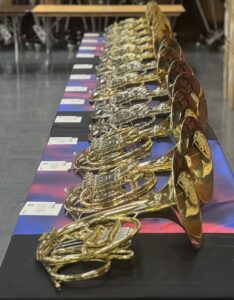
Your Students Can (and Should) Come Too
I was late to this one. For years, I treated conferences like solo missions. I didn’t bring students because I figured they’d be bored, overwhelmed or honestly just kind of annoying for me to supervise for several days.
But then one of my students — a sophomore trumpet player named Erik who was really into jazz improvisation — begged to tag along to ITG. We worked it out. He registered for a Youth Day pass and practiced a solo to play in a masterclass. He showed up with his trumpet, a notebook and zero expectations.
I watched that kid transform over the next three days. He nerded out with other students in the exhibit hall. He asked real questions. He even started a conversation with a vendor like he was pitching “Shark Tank.” On the drive home, he was already planning his college audition list.
The best part? He didn’t suddenly get better — he just started seeing himself as a real musician. He found his people.
Even for students who aren’t planning to major in music in college, the exposure is valuable. Most conferences offer reduced-rate student passes or even free Youth Day programs. At NFA, they do a whole track for flutists aged 9 to 18 — no auditions required. Just show up and learn. The energy in those rooms is a mix of excitement, squeaky notes and total joy. Nobody’s trying to win. They’re just trying to get better.
If you’re thinking about bringing a student, here’s what worked for me:
- Sit down with them and their parents and help map out a couple of sessions or booths to check out.
- Set small, fun goals like “introduce yourself to a vendor” or “ask a question at a clinic.”
- Give them space to explore but set check-in points so they don’t disappear into the exhibit hall for three hours playing every flugelhorn in sight.
It’s extra work, but it’s also some of the most meaningful musical experiences a student can have. One of my kids came back from a conference and started practicing more, not because I asked her to, but because she wanted to sound like the flutist she heard on stage. That’s the kind of motivation no rubric can teach.

You’ll Learn More in the Lobby Than You Expect
The best stuff often happens outside the main event. Conversations and observations in the lobby, impromptu “sessions” from a presenter before they even begin and even getting stuck on an elevator with a pro — these are some of my favorite and most helpful memories.
I once had a 10-minute chat with a vendor about beginner trumpet mouthpieces that completely changed how I set up my 5th-grade brass class. I shared a bench outside the exhibit hall with a retired teacher who gave me a pep talk I didn’t know I needed. He told me, “You don’t figure it all out in year three. Or five. Or 20. By the way, don’t buy coffee here — go around the corner. It’s $3 cheaper.” Invaluable advice, and he was right about the coffee, too!
There’s something about being in a space where everyone gets what it’s like to experience and teach music that just makes people more open. You can talk about burnout without having to explain it. You can laugh about concert disasters and feel less alone.
Also, if you’re an introvert, you don’t have to “network.” You can just say hi. You can ask someone what session they liked. You can tell the person sitting next to you in a clinic, “That was a great idea — do you use it with your kids?”
These little interactions have led to email follow-ups, score swaps, even a guest clinician visit once. None of it was planned. I just showed up, listened and said thank you when something helped.
That’s how most relationships in music education work. Not through LinkedIn, but through shared notes and hallway conversations.
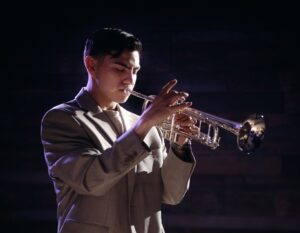
Competitions are Optional. Growth Isn’t.
Many of these conferences and guilds host competitions, but you do not have to enter a competition to get something out of a conference. Neither do your students.
I’ve had friends compete in guild competitions, and I’ve had others just go, watch and soak it all in. Both came home better musicians.
Competitions can be useful if you frame them right. A few years ago, I had a student, Mia, who saw the competition online. She had absolutely no desire to perform or compete at the national level, but when it came time for solo ensemble sign up, she chose to play a solo. It was the first time Mia ever performed solo in front of a room of strangers. She received written feedback from a clinician she respected, and walked away saying, “I know exactly what I want to work on now.”
That’s a huge win.
Competitions only turn weird when the outcome starts mattering more than the experience. If you spend more time looking at a trophy that could support an F150 than you think about the feedback, you may need to reconsider your approach!
What I’ve learned is that most kids don’t need to win to grow. They just need a moment where someone outside of school takes them seriously. Watching other students perform — especially students their age — can be eye-opening.
Bonus tip: Some conferences have low-stakes performance opportunities like festival ensembles where students can just sign up and play. One of my students said his favorite part of the trip was sight-reading movie themes with 40 other trumpet players in a random hotel ballroom. No pressure, just fun.

You Don’t Need a Reason to Go
I used to think I needed to justify attending a conference. Like I had to be presenting or chaperoning or recruiting. Something.
But the truth is you can go just to go. You can go because you’re burned out and need fresh air. You can go because you want to hear someone else make beautiful sounds and remember what that feels like. You can go because your own practice routine has become stale, and you want to feel like a musician again — not just a shepherd for a herd of turtles. You can go because you want to try a new warm-up or talk shop with someone who gets it or sit in the back of a clinic and think, “Okay, maybe I can get better at this.”
Teaching music is joyful and exhausting. It’s both. Some days you’re laughing with your kids. Some days you’re putting a to-do list together that says:
- Enter grades
- Repair tuba
- Get life together
Conferences — the good ones — make room for that. You can be inspired without pretending you’ve got it all figured out.
One of the most meaningful moments I’ve had at a conference wasn’t in a clinic or a concert. It was in a quiet corner of the exhibit hall, watching a middle schooler try a new trumpet for the first time. A teacher was next to him, quietly encouraging, asking questions, helping him compare sounds. In the other corner, an older gentleman was trying out some other horns. Both had a gleam in their eyes. They weren’t trying to win anything — they were just trying to get better. Honestly, that’s the whole point.
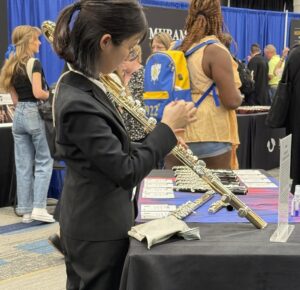
Thinking About Going? Start Here.
These conferences don’t all meet every year, so check the latest info before planning. But if you’re looking for a place to start, this list covers a good range from instrument-specific to broader music education events.
Instrument-Specific Conferences (Guild Style):
- International Clarinet Association (ICA) ClarinetFest
- International Double Reed Society (IDRS)
- International Horn Society (HIS)
- International Trombone Festival (ITF)
- International Trumpet Guild (ITG)
- International Tuba Euphonium Conference (ITEA)
- International Women’s Brass Conference (IWBC)
- The National Flute Association (NFA)
- North American Saxophone Alliance (NASA)
- Percussive Arts Society International Convention (PASIC)
Wider Music Education Conferences:
- The Midwest Clinic International Band & Orchestra Conference — Massive conference held in Chicago in December for band, orchestra, jazz and music educators.
- National Association for Music Education (NAfME) — State and regional events vary.
- Texas Music Educators Association (TMEA) — Even if you’re not from Texas, this one’s a biggie.
- American String Teachers Association (ASTA) — String and orchestra teachers and players can find resources, professional education, a collaborative community and more.










